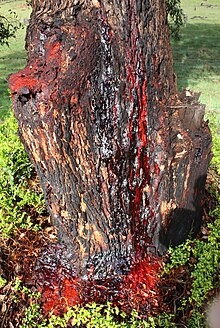Gum (botany)

Gum is a sap or other resinous material associated with certain species of the plant kingdom. This material is often polysaccharide-based and is most frequently associated with woody plants, particularly under the bark or as a seed coating. The polysaccharide material is typically of high molecular weight and most often highly hydrophilic[1] or hydrocolloidal.
As seed coating[]
Many gums occur as seed coatings for plant species; the adaptive purpose of some of these gummy coatings is to delay germination of certain flora seeds. An example of such a gummy coating occurs in the case of Western poison oak, a widespread shrub in western North America.[2]
See also[]
- Cambium
- Gummosis
- Latex
- Natural gum
Line notes[]
- ^ Schröder, Monika J. A. (2003). Food Quality and Consumer Value: Delivering Food that Satisfies. Springer. ISBN 3-540-43914-5.
- ^ Hogan, C. Michael (15 October 2008). Nicklas Strömberg (ed.). "Western poison-oak: Toxicodendron diversilobum". GlobalTwitcher. Archived from the original on 21 July 2009.
Categories:
- Natural gums
- Plant physiology
- Botany stubs